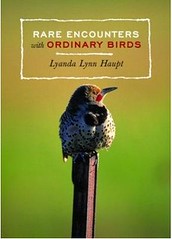 In 2001, the US Fish and Wildlife Service published their survey results of fishing, hunting and wildlife-associated recreation and estimated that there are 46 million bird watchers in the United States, making it the second most popular hobby in that country. According to a report by the New York Audubon Society, there were only a dozen bird festivals but in 1993, when the report was published, there were more than 250 every year throughout America. Why is watching birds so popular? Several reasons include the fact that birds are easily visible everywhere that humans go, and birds tend to do interesting things where ever they are. Lyanda Lynn Haupt's extraordinary first book, Rare Encounters with Ordinary Birds (Seattle: Sasquatch, 2001), now available in paperback, celebrates that unique bond shared between wild birds and the people who watch them.
In 2001, the US Fish and Wildlife Service published their survey results of fishing, hunting and wildlife-associated recreation and estimated that there are 46 million bird watchers in the United States, making it the second most popular hobby in that country. According to a report by the New York Audubon Society, there were only a dozen bird festivals but in 1993, when the report was published, there were more than 250 every year throughout America. Why is watching birds so popular? Several reasons include the fact that birds are easily visible everywhere that humans go, and birds tend to do interesting things where ever they are. Lyanda Lynn Haupt's extraordinary first book, Rare Encounters with Ordinary Birds (Seattle: Sasquatch, 2001), now available in paperback, celebrates that unique bond shared between wild birds and the people who watch them.
The size of this book is deceptive; the stories are much more substantial than this slim (191 pages) paperback might suggest. This book is a collection of 17 amusing and touching essays. These essays focus on the author's encounters with and observations of everyday birds, revealing how her connections with people and with the natural world have been altered and enriched as the result of her life with birds. In one essay, for example, we find the author quietly reveling in the enchanting song of the Varied Thrush while briefly vacationing at her parents' home; in another essay, we laugh alongside her at the amusing antics of courting woodpeckers, and in yet another, we are privy to her brooding about the tremendous odds against White-crowned Sparrow fledglings surviving to adulthood while simultaneously contemplating having a baby of her own. The author also considers the sullied reputation of European Starlings, an introduced bird species; the special auditory niches of birdsongs, and describes how an adult Caspian Tern shelters a sub-adult under its open wing during a downpour. Haupt also sweetly describes how her non-birder husband reveals his own growing compassion for birds when he temporarily adopted a wild Crow that had fallen from its nest;
One evening I came home and there on the couch I found my husband, Tom, with a freshly fledged Crow sitting calmly in his lap. They were busy watching Star Trek: The Next Generation; since Captain Jean-Luc Picard was in the midst of an absorbing monologue, they hardly registered my arrival, but finally they both glanced my way, Tom looking a little sheepish, the Crow nibbling bits from a can of gourmet cat food.
We also learn about some of the rituals that unite the birding community, such as the game, "first bird of the year", where the first bird seen on New Year's Day is adopted as a sort of "theme bird" for the next 365 days. In another essay, the author eloquently reminds us of the noble, unique life possessed by even the most ordinary birds when she poignantly describes what were probably the last days of an individual shorebird;
In the morning boisterous Crows alert me to the Peregrine [falcon] overhead, flying for open water, talons clutched around a smaller bird body. ... My thoughts border on a hope that the Peregrine had swifty culled the one-eyed Dunlin, sparing her weeks of increasing starvation and confusion. But that night I see the bird on the side of the road, alone now, drinking from a mud puddle. Oil from the many parked cars has invaded the ground here, and rises in the puddle -- rainbow colors around the Dunlin's thin reflection. She peers into the water with one good eye. Holy, simple, shining bird. I speak to her out loud. "I have seen you."
Haupt explains the popularity of birds thusly, "Birds will give you a window, if you allow them. They will show you secrets from another world, a fresh vision that, though avian, can accompany you home and alter your life." After reading this affecting and lyrical book, not only will birders see their subjects with a fresh eye, but those who never seriously considered a bird before will have discovered that open window through which they, too, can enter the magical world of birds.
Lyanda Lynn Haupt won the Washington State Book Award for her collection of essays, Rare Encounters with Ordinary Birds. Haupt's essays and reviews have appeared in a number of journals, including Conservation Biology and Wild Earth. A few months ago, I reviewed Haupt's second book, Pilgrim on the Great Bird Continent (NYC: Little, Brown, 2006), and I liked it so much that I requested a review copy of her first book as a result. I think you'll like this book, too.
.

This reminds me: some of the birders here in Finland had a competition to see who could see the most species whilst naked. With the sauna culture, this isn't quite as bad as it sounds, but still. Anyway, one guy was skiing along, and saw a species not on his list, so he promptly stripped off (in sub-zero temperatures), just so he could tick it off his list.
The Finns have many admirable qualities, but moderation is rarely one of them.
Bob